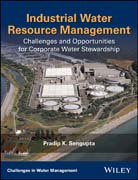
Industrial Water Resource Management: Challenges and Opportunities for Corporate Water Stewardship
Sengupta, Pradip K.
Provides the tools that allow companies to understand the fundamental concepts of water resource management and to take proper action towards sustainable development Businesses, communities, and ecosystems everywhere depend on clean freshwater to survive and prosper. When the same source of water is shared for economic, social, and environmental causes it becomes the responsibility of every sector to develop a sustainable water strategy beneficial for all. This book offers a water resource management plan for industries that is directly implementable and consistent with the Water Framework Directives of different countries with a special emphasis on developing countries a plan that is economically efficient, socially equitable, and environmentally sustainable. Industrial Water Resource Management, Challenges and Opportunities for Efficient Water Stewardship offers explicit technical and investment solutions, socioeconomic and legal instruments, and recommendations for institutional restructuring. Written by a leading world expert in the field, it covers a wide range of topics including: Source water assessment and protection Water audit, industrial water footprint assessment an evaluation of tools and methodologies Corporate water disclosure methods and tools Water stewardship by the industries Stakeholder collaboration and engagement New technologies enabling companies to better manage water resources Given the well–known challenge of managing natural resources in a way that maximizes and sustains social welfare, this book provides an invaluable point of reference for applied researchers and policy makers working in water resources management. INDICE: CHAPTER 1: INTRODUCTION .1.1 The context .1.1.1 The story of Coca–Cola in India .1.2 Water goals in 21st Century .1.3 Water ethics .1.4 Value of water .1.5 Water and energy nexus .1.6 Global Water Stress .1.7 Industrial impact on water resource .1.8 Water Sustainability .1.9 Impact of climate change .1.10 Dimensions in industrial water management .1.11 Green growth and green business .1.12 Conclusion .Bibliography .CHAPTER 2: WATER SCENARIOS AND BUSINESS MODELS OF THE TWENTY–FIRST CENTURY .2.1. Water scenario .2.2. Water indicators .2.3 Global water trends .2.4 Business models .2.5 Integrated water resource management .2.6 Sustainable development goal for business sector .2.7 Conclusion .Bibliography .CHAPTER 3 UNDERSTANDING WATER .Abstract .3.1. Introduction .3.2 Hydrological cycle .3.2.1 Water cycle and ecosystems .3.3 Water on land .3.3.1 Soil water .3.4 Stores of water .3.5 Surface runoff .3.6 River and river basin .3.7 Industrial impact on river flow .3.8 Surface water Management .3.9 Groundwater .3.10 Conclusion .Bibliography .CHAPTER 4: CORPORATE WATER STEWARDSHIP .Abstract .4.1. Introduction .4.2 Why Water stewardship? .4.3 Aspects of water stewardship .4.4 Challenges in water stewardship .4.5 Developing a corporate strategy in water stewardship .4.6 Goals and commitments .4.7 Establish systems and processes .4.8 Opportunities in water stewardship .4.9 Water Literacy .4.10 Action programmes under WSI .4.11 Outcome of water stewardship initiatives (WSI) .4.12 Water stewardship standards .4.13 Global organisations for facilitating water stewardship. .4.14 Water stewardship tools .4.15 Case studies .4.16 Conclusion .Bibliography .CHAPTER 5: WATER GOVERNANCE FRAMEWORK AND WATER ACTS .Abstract .5.1 Introduction .5.2 What is water governance? .5.3 Water Laws .5.4 Tasks of water governance .5.5 Challenges in water governance .5.6 Legal framework .5.8 Principles of water governance .5.9 Spatial scale of Water governance .5.10 Hierarchical governance .5.11 Cross cutting authority of governance .5.12 Stakeholders engagement in water governance .5.13 Functions and functionaries of the water governance .5.14 Role of civil society organisations (CSO) .5.15 Water governance framework of different countries (case studies) .5.16 Conclusion .Bibliography .CHAPTER 6: WATER QUALITY STANDARDS AND WATER POLLUTION .ABSTRACT .6.1. Water Quality Standards .6.2. Industrial water pollution .6.3 Conclusion .Bibliography .CHAPTER 7: WATER ABSTRACTION, PURIFICATION AND DISTRIBUTION .Abstract .7.1 Overview .7.2 Water sourcing by industries .7.3 Surface water Abstraction .7.4 Methods of groundwater abstraction .7.5 Water abstraction from sea .7.6 Conveyance system .7.7 Water Purification .7.8 Water Supply and distribution .7.9 Water delivery and distribution software .7.10 Conclusion .Bibliography .CHAPTER 8 WATER RESOURCE ASSESSMENT .Abstract .8.1 Introduction .8.2 Water resource assessment tools .8.3 General scenario .8.4 WRA basics .8.5 WRA data generation .8.6 Water balance .8.7 Estimation of surface runoff .8.8 Estimation of stream discharge .8.9 Estimation of renewable groundwater resource .8.10 Estimation of pond/reservoir storage volume .8.11 Estimation of source water quality .8.12 Aquifer test .8.13 Build understanding of key catchment processes and interaction .8.14 Long term simulation of catchment behaviour .8.15 Assessment of sustainable and exploitable water over assessment period .8.16 Presentation of water resource assessment .8.17 Conclusion .Bibliography .CHAPTER 9 CORPORATE WATER ACCOUNTING AND DISCLOSURE .Abstract .9.1. The context .9.2 Methods of assessing water risk .9.3 Water profiling .9.4 Water foot print .9.5 Industrial response to WF assessment .9.6 Water disclosure document .9.7 Benefits of water disclosure .9.8 Conclusion .Bibliography .CHAPTER 10: DETECTION OF WATER LOSS AND METHODS OF WATER CONSERVATION IN INDUSTRIES .Abstract .10.1. Overview .10.2 Getting Started Develop a Water Conservation Strategy .10.3 Detection of overuse .10.4 Water audit .10.4 Methods of water conservation .10.5 Water saving in agriculture industries .10.6 Rainwater harvesting .10.7 Conclusion .Bibliography .CHAPTER 11 CORPORATE SOCIAL RESPONSIBILITY: WAY AHEAD IN WATER AND HUMAN RIGHT .Abstract .11.1 Introduction .11.2 Public policy on CSR .11.3 CSR policy of the corporates .11.4 Addressing water in CSR .11.5 CSR management framework .11.6 CSR initiatives in water sector .11.7 International standards and guidelines .11.8 Case studies .11.9 Future of CSR .11.10 Conclusion .Bibliography .GLOSSARY .INDEX Annexure
- ISBN: 978-1-119-27250-2
- Editorial: Wiley–Blackwell
- Encuadernacion: Cartoné
- Páginas: 488
- Fecha Publicación: 03/11/2017
- Nº Volúmenes: 1
- Idioma: Inglés
